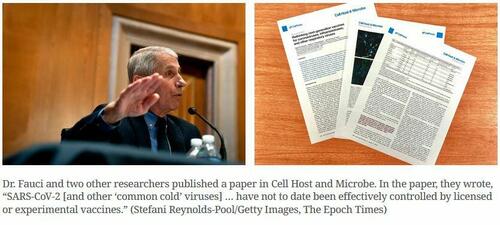by Marina Zhang via The Epoch Times (emphasis ours),
COVID-19 in 2023 has been full of revelations and controversy.
Most health leaders involved in the U.S. pandemic response have resigned or been replaced, with one leaving his agency with a study that received much fanfare for a somewhat controversial take on vaccines.
Compared to 2022, the science on the effectiveness and risks of masking and vaccinations has become increasingly clear with the release of highly authoritative studies this year.
Let us review the top 10 major events that took place in relation to COVID in 2023.
1. FDA and CDC Find More COVID Vaccine Adverse Events, Including Stroke
Beginning in January, documents released under the Freedom of Information Act (FOIA) found that the U.S. Centers for Disease Control and Prevention (CDC) detected hundreds of safety signals for Pfizer and Moderna COVID-19 vaccines. This included adverse reactions of myocarditis, multisystem inflammatory syndrome in children (MIS-C), ventricle dysfunctions in the heart, and many more.
On Jan. 13, the U.S. Food and Drug Administration (FDA) and the CDC released a joint statement declaring they detected stroke as a new safety signal in older people who took the Pfizer bivalent boosters. Researchers from Kaiser Permanente also reported in October that people who took the COVID boosters with the influenza vaccine were at a greater risk of stroke.
Days later, researchers affiliated with the FDA published a preprint finding that older people who received the Pfizer booster shot had a higher rate of Bell’s palsy, a type of facial paralysis.
In a statement released in May, the FDA determined that "the current evidence does not support the existence of a safety issue," as findings of stroke among the elderly decreased. They added that agencies will continue to evaluate new data as they become available.
2. Vaccines Cannot ‘Effectively’ Control COVID: Fauci After Resigning
The resignation of Dr. Anthony Fauci, former director of the National Institute of Allergy and Infectious Diseases (NIAID), was noteworthy given his role in leading the United States pandemic response and his actions soon after resigning.
Dr. Fauci was very vocal in encouraging vaccine uptake and regularly appeared on television programs motivating people to get vaccinated.
“It’s as simple as black and white. You’re vaccinated, you’re safe. You’re unvaccinated, you’re at risk. Simple as that,” Dr. Fauci said on an MSNBC program during the Delta wave.
Before the Delta wave in the United States, Dr. Fauci compared vaccinated people to “dead ends” for the virus on CBS’s Face the Nation.
However, on Jan. 11, weeks after his resignation at the end of 2022, Dr. Fauci and two other researchers published a paper in Cell Host & Microbe that gained traction due to their comments on the effectiveness of vaccines in controlling respiratory viruses.
“SARS-CoV-2, endemic coronaviruses, RSV, and many other ‘common cold’ viruses … have not to date been effectively controlled by licensed or experimental vaccines,” the authors wrote in their introduction.
They then addressed some basic immune principles, expressing that the current vaccines induce immunity in the body but not in the airways, yet current respiratory viruses primarily infect the airways.
“The vaccines for these two very different viruses (influenza and SARS-CoV-2 viruses) ... have common characteristics: they elicit incomplete and short-lived protection against evolving virus variants that escape population immunity,” the authors wrote.
While some fact-checkers argue that the study does not contradict Dr. Fauci’s stance during the pandemic, others interpret this as his “coming clean.”
3. Gold Standard Review Finds Evidence of Masking ‘Uncertain’
The Cochrane Library, widely considered the gold standard for systematic reviews, published a review on Jan. 30 stating there was “uncertainty about the effects of face masks.”
“The low to moderate certainty of evidence means our confidence in the effect estimate is limited, and that the true effect may be different from the observed estimate of the effect,” the authors concluded, adding that “pooled results of [randomized controlled trials] did not show a clear reduction in respiratory viral infection with the use of medical/surgical masks.”

The review’s findings drew widespread criticism from mainstream media. Several articles soon followed, highlighting the effectiveness of masking. The Cochrane editor-in-chief, Dr. Karla Soares-Weiser, also released a statement in March claiming that the review did not show masks don’t work.
“Many commentators have claimed that a recently-updated Cochrane Review shows that ‘masks don’t work’, which is an inaccurate and misleading interpretation,” Dr. Soares-Weiser wrote.
“It would be accurate to say that ... the results were inconclusive.”
Currently, the CDC still recommends masking.
“Masks have become political,” said an author of the review on CNN. “I can only tell you what the science is....I can’t tell you whether they work or don’t work. But it’s more likely than not that they don’t work.”
4. Repeated Vaccination Weakens the Immune System, Studies Suggest
Multiple doses of the Pfizer or Moderna COVID-19 vaccines lead to higher levels of antibodies called IgG4. A growing body of research suggests that these antibodies can make the immune system less reactive to COVID-19 spike proteins and more susceptible to potential spike protein damage and infections.
The first of these studies was published in the January issue of Science Immunology. The authors found that a third dose of the mRNA vaccine was linked to an increase in IgG4 subtypes in mice. IgG4 antibodies are responsible for tuning down the immune system to prevent immune overactivation.
However, in the context of COVID-19 and its vaccines, where the immune system must be ready to fight, this may promote “unopposed SARS-CoV2 infection and replication by suppressing natural antiviral responses,” another study published in May reported.
These findings align with other studies that found repeat vaccinations to be associated with increased risks of infections, as reported by a study by the Cleveland Clinic. The team’s earlier study also showed that the more doses a person receives, the more likely they are to get infected.

5. DNA Contamination Detected in mRNA Vaccines, and FDA’s Response
In the spring of 2023, researchers found that mRNA COVID-19 vaccines contain DNA fragments, including controversial SV40 genes, previously undisclosed to the public.
Genetic scientist Kevin McKernan initially discovered that DNA fragments were packaged into lipid nanoparticles with the mRNA vaccine segments so that the DNA could enter cells. However, this means the fragments pose a risk of being integrated into the cell’s genome.
In a preprint published in April, Mr. McKernan and his team found DNA fragments in both Moderna and Pfizer vaccines that exceeded the European Medicines Agency’s (EMA) 330 nanograms (ng) per milligram requirement and the FDA’s 10 ng/dose requirements.
Furthermore, Pfizer’s mRNA vaccines contained genes from the simian vacuolating virus 40, also known as SV40. The full SV40 virus had a controversial link to cancer stemming from the time when early polio vaccines were accidentally contaminated with the SV40 virus.
“Pfizer never disclosed the SV40 information to the EMA. They gave them a plasmid map of what the plasmid consisted of, with all of the features labeled, with the exception of the SV40 site,” Mr. McKernan said on EpochTV’s American Thought Leaders program.
Apart from being a safety concern, the DNA fragments also indicated potential problems with drug regulation, Mr. McKernan said.
Initially, Pfizer intended to make its vaccines using a PCR machine, which would have been more expensive and time-consuming. However, the company later switched to using bacteria, likely because that method is faster and more efficient.
Pfizer never tested for the safety implications this change would have.
“They never ran the clinical trials on that material [bacteria]. Clinical trials were run on this PCR process, and then they switched to a new process after the clinical trials,” Mr. McKernan said.
Health practitioners, researchers, and journalists have expressed concern about the unknown risks that DNA contamination may present to the public. Some have called for the recall of Pfizer vaccines.
However, in the FDA’s response to investigative journalist Maryanne Demasi, the agency did not indicate that it intended to recall the vaccines.
https://www.zerohedge.com/medical/top-10-covid-events-year-revealing-facts-unspoken-and-unknown

No comments:
Post a Comment
Note: Only a member of this blog may post a comment.